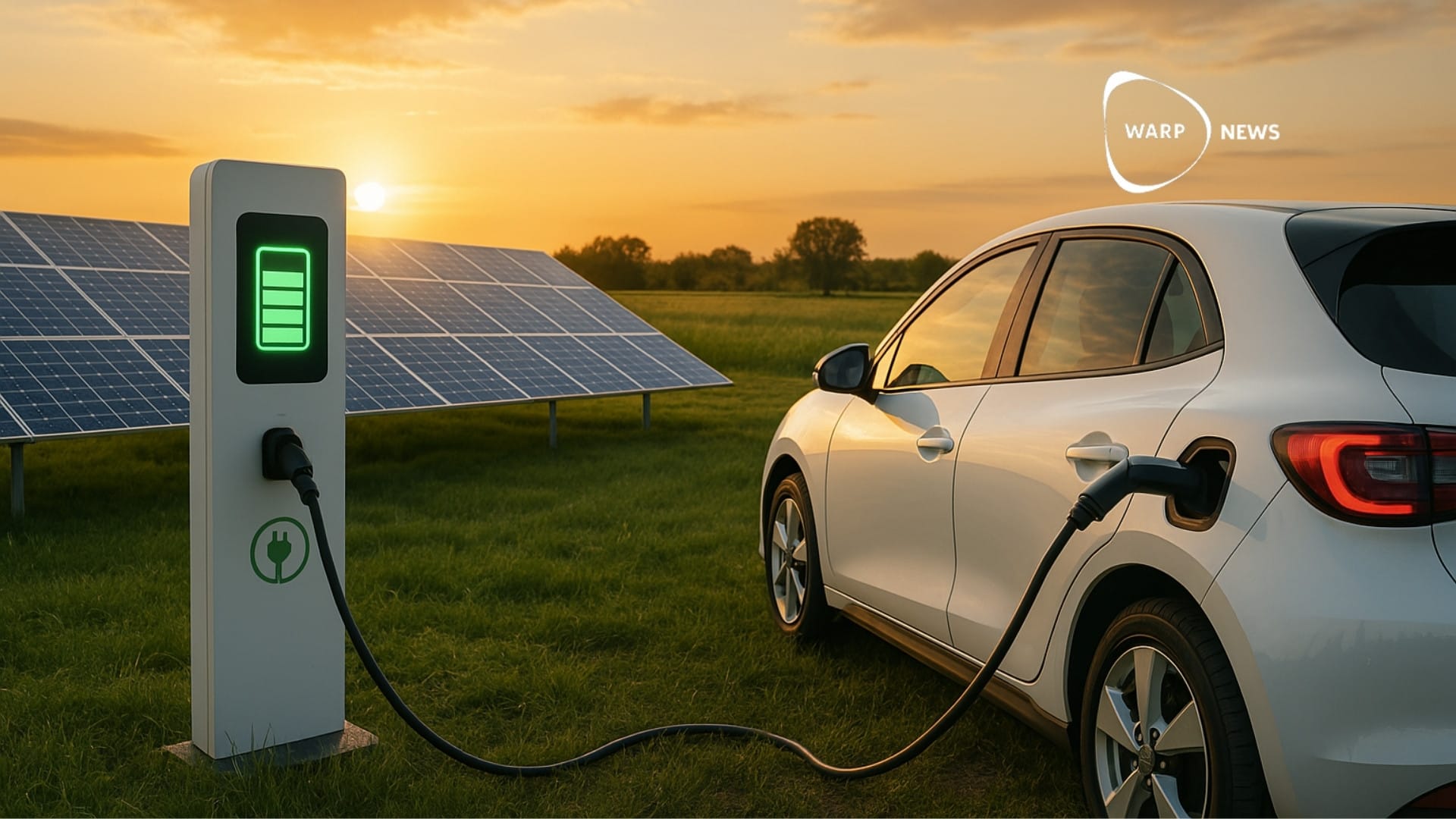
🔌 Jonas Birgersson: "All the electricity you need for a low, fixed fee"
Jonas Birgersson became an internet pioneer by promising and delivering all the internet you need for $20 a month. Now he believes that the same thing can be done with electricity. "For a low, fixed price, you have all the electricity you need."
Share this story!
Join Warp Institute's event with Jonas Birgersson about the Energy Society. October 5 in Lund. Read more and RSVP here.
It is the 1990s in Sweden. After yuppies, 500 percent interest, an economic crisis, and several rescue packages, the once rosy idea of a grand Swedish welfare state is something for the history books. The government is constantly presenting new budget cuts. Few Swedes can bear to look to the future.
Into this Sweden steps a man from Lund, in a fleece jacket, and says that this new thing called the internet will change the world - and Sweden.

The few who care, say it won't work. Telephone calls are paid per minute and being connected to the 'net' becomes very expensive and very slow.
"Nope", says the guy in the fleece jacket. His name is Carl Jonas Birgersson and answers to 'Jonas', or 'Birger'. For a fixed cost of SEK 200 a month ($20), we will be able to offer as much internet as you need, around the clock, all year round, he promises.
Impossible! The telephone network would crash. That will never work!
That's why we're going to build a new network just for the internet, replies Birgersson. And then he did.
Unto us, a savior is born
During the second half of the 90s, Birgersson and a bunch of other Internet pioneers became extremely popular. In 1999 alone, 1,681 articles were written in Swedish media about him and his company, Framfab.
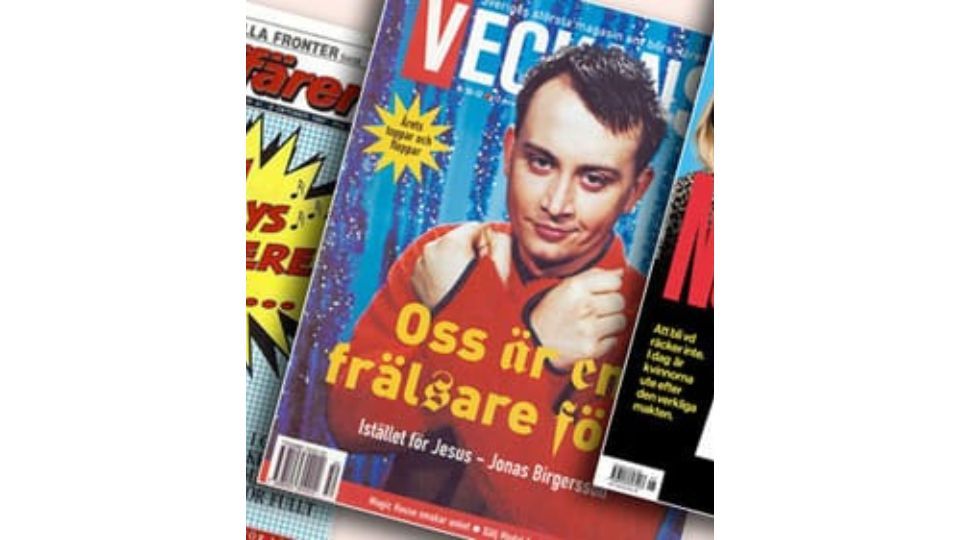
Not only Swedish media is interested. Wall Street Journal, Financial Times, and many others write about him.
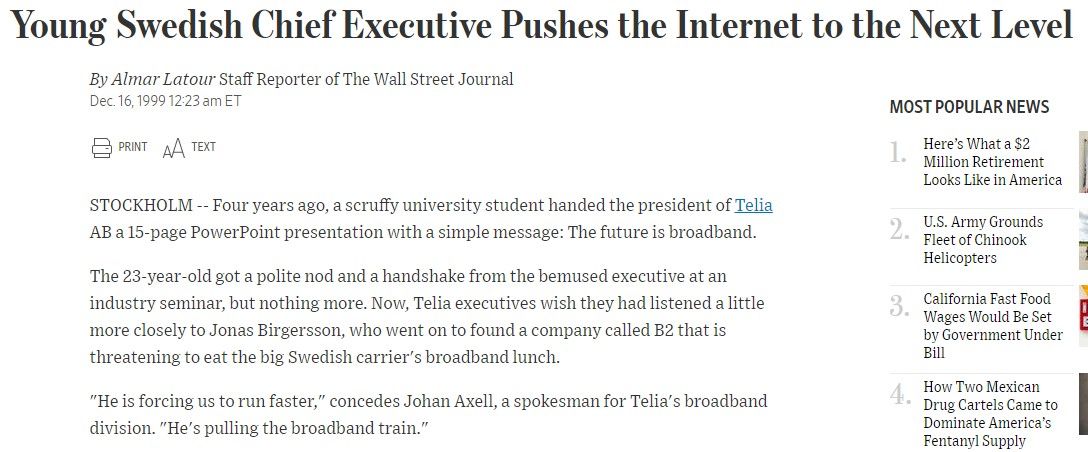
But just when the future is finally here and 1999 has become the year 2000, it all comes crashing down with a spectacular bang. The Internet bubble bursts.
Or did it? A financial bubble definitely burst, but most of what the internet pioneers predicted has come true, and more.
Jonas Birgersson left most of the limelight but tirelessly continued the work. Through the companies Labs2 and Via Europa, he builds advanced broadband in Sweden and abroad. Together, the two companies have a turnover of about $10 million.
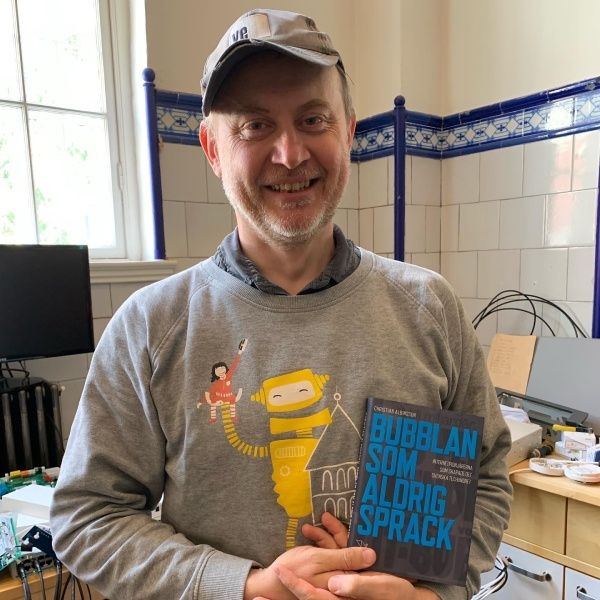
A new idea: The energy society
In an interview with Warp News, Jonas Birgersson talks about a new idea. The background to the question is the political debate leading up to the Swedish elections.
"Unfortunately, when it comes to ideas about the future it feels a bit like a sterile desert," he says. "I am burdened with military history. In the Swedish Armed Forces, there are ten rules for leadership. They are not interrelated, apart from the first. The leader's job is to set the goal and stick to it. What does it tell us then if none of our possible leaders of the country even describe a goal?"
What does he himself think the goal should be?
"What we saw as the next society after the network society - that was the energy society. This was already said in 95 to 97," says Birgersson.
“The power grids were developed approximately in the 1880s. In their structure, they have not changed since then. No wonder the power grid is struggling a bit. Amazing that it managed to last this long. But you will have to redo it. It's nothing difficult. Because what we can now do with batteries is intermediate storage, as it is called in network parlance. Network-wise, it's like night and day.”
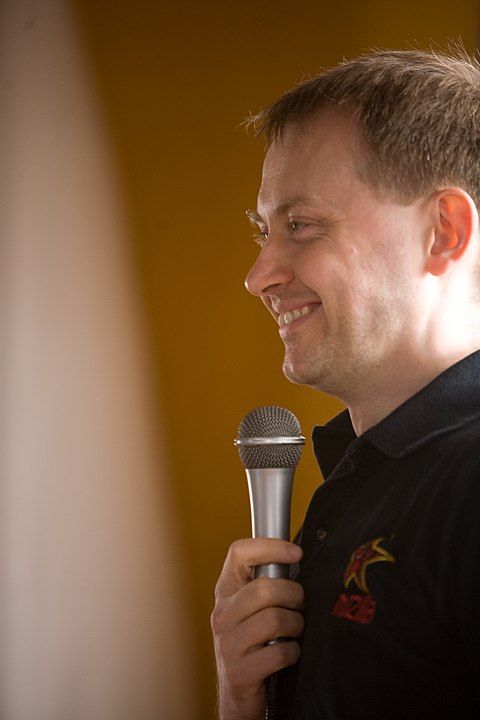
He gives an example of something you may have experienced. That you are watching a national football or hockey game and suddenly the neighbors across the street are cheering. Three seconds later you see on your TV that your country scores a goal and you cheer too. Nowadays you don't really watch live. The stream of the game coming into your television or computer has a buffer of 30 seconds. For some reason, the neighbors' stream worked a little better, maybe they have faster and more stable broadband. Therefore, they saw the goal three seconds before you, but normally you wouldn't have noticed it at all because your stream has been cached.
"The same thing can now be done with electricity," says Birgersson. "It's also not particularly difficult and not particularly expensive. It's just that you have to think in a new way. Produce electricity locally with wind or solar cells and then you store it in your home, in the city block, or in the city.”
"Just as you started paying $20 a month for internet, I think we will come to the same thing for electricity. For a low, fixed price, you'll have all the electricity you need," says Jonas Birgersson.
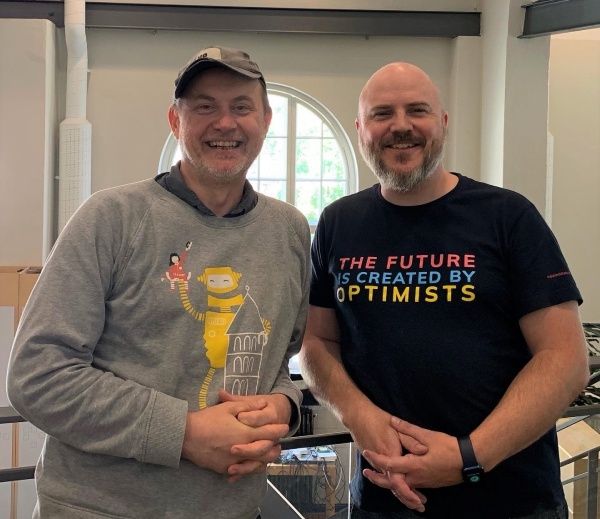
Waste electricity
Children will say to their parents in the future: "Did you used to save electricity?"
"If we do it right, we will be able to have a surplus of electricity, and will use it for things that are actually good things, but we don't do that today because it is too expensive and there is a bit of a shortage. For example, electrically heated roads and pavements. Then we avoid slipperiness and lots of broken bones. You can also make it a little nicer and add lighting to the streets.”
Batteries in homes
A key in Birgersson's energy society is the batteries. Batteries are still not cheap, but over time they've dropped sharply in price and will do so if we use and buy them more and more.
“It is a volume relationship. Those who follow Warp News know this. You have described it. When we double the volume, we roughly halve the price.”

If everyone has a battery at home, the price of batteries would be pushed down and we could all charge the car and cook pasta at the same time. "Everyone then gets this margin, everyone gets this corresponding thirty seconds that allows you to watch hockey, even if the net goes up and down a little."
But not just individually – connected.
"If you do it the internet way, you connect with everyone else, so you can send electricity between each other."
This leads to high operational reliability.
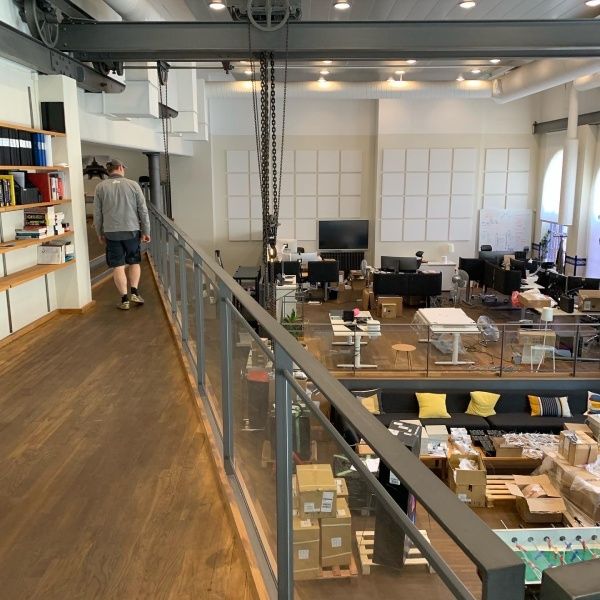
Electricity directly in the broadband socket
Another interesting component is the power wires.
"Ethernet, the computer sockets can send both power and data. It can send four profiles, 15, 30, 60, or 90 watts. There will soon be a new standard where you go up to 120 watts. What's good about that?" asks Jonas Birgersson. "Well, partly that it exists. But also that these networks can be installed by anyone. You do not need to have a license as an electrician. Because these wires are intelligent. If I cross the conductors, then there is no electricity. It needs a signal to send electricity, but that signal doesn't come through my fingers, so then no electricity comes. Therefore, this can be installed by anyone.”
Make the future come sooner
Jonas Birgersson believes that this can be done, and that all the technology to do it already exists. Above all, he is convinced that it should be done. That it would be good for society if we got an abundance of electricity at a low, fixed price. Unlimited access to the internet gave us a massive flow of creativity and innovation.
"We who built the fiber nets wanted them to be used as much as possible. We had no idea what people would come up with. That's the advantage of infrastructure, you don't have to figure out what people are going to do with it."
"Of course, you shouldn't waste electricity unnecessarily. But much of what we do with bandwidth and processing power today, which has created a lot of unexpected innovations, is a waste of bandwidth and processing power."
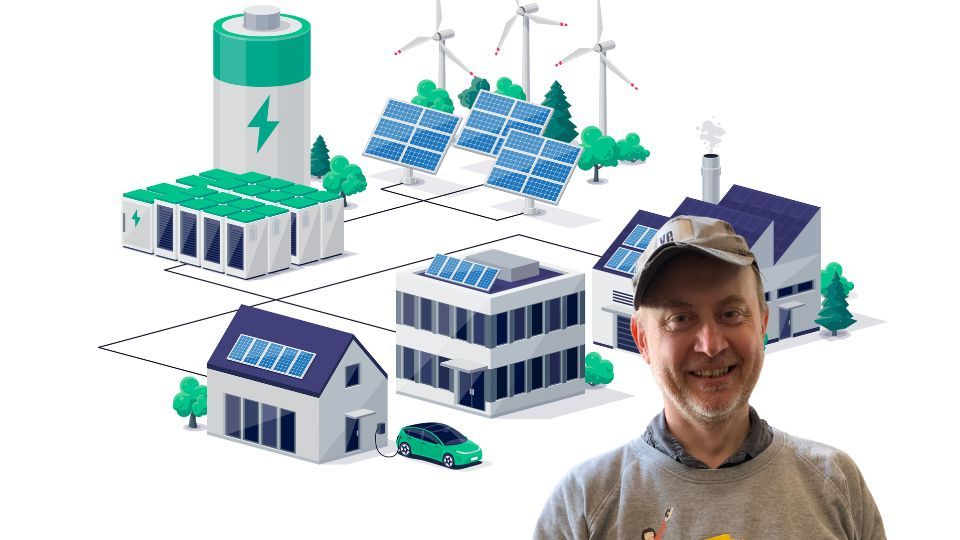
Now it's the 2020s. We have inflation, a war in Europe, gang shootings, and rapidly rising energy prices. Few Swedes can bear to look to the future.
He has hung the fleece jacket in the closet, but now he is standing there again, the man from Lund, and says that now is the time to change Sweden and the world - again.
Join Warp Institute's event with Jonas Birgersson about the Energy Society. October 5 in Lund. Read more and RSVP here.
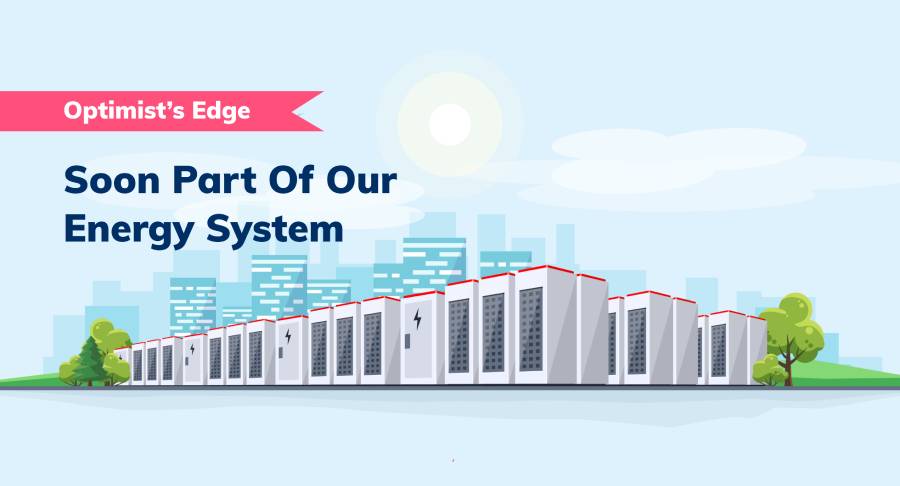
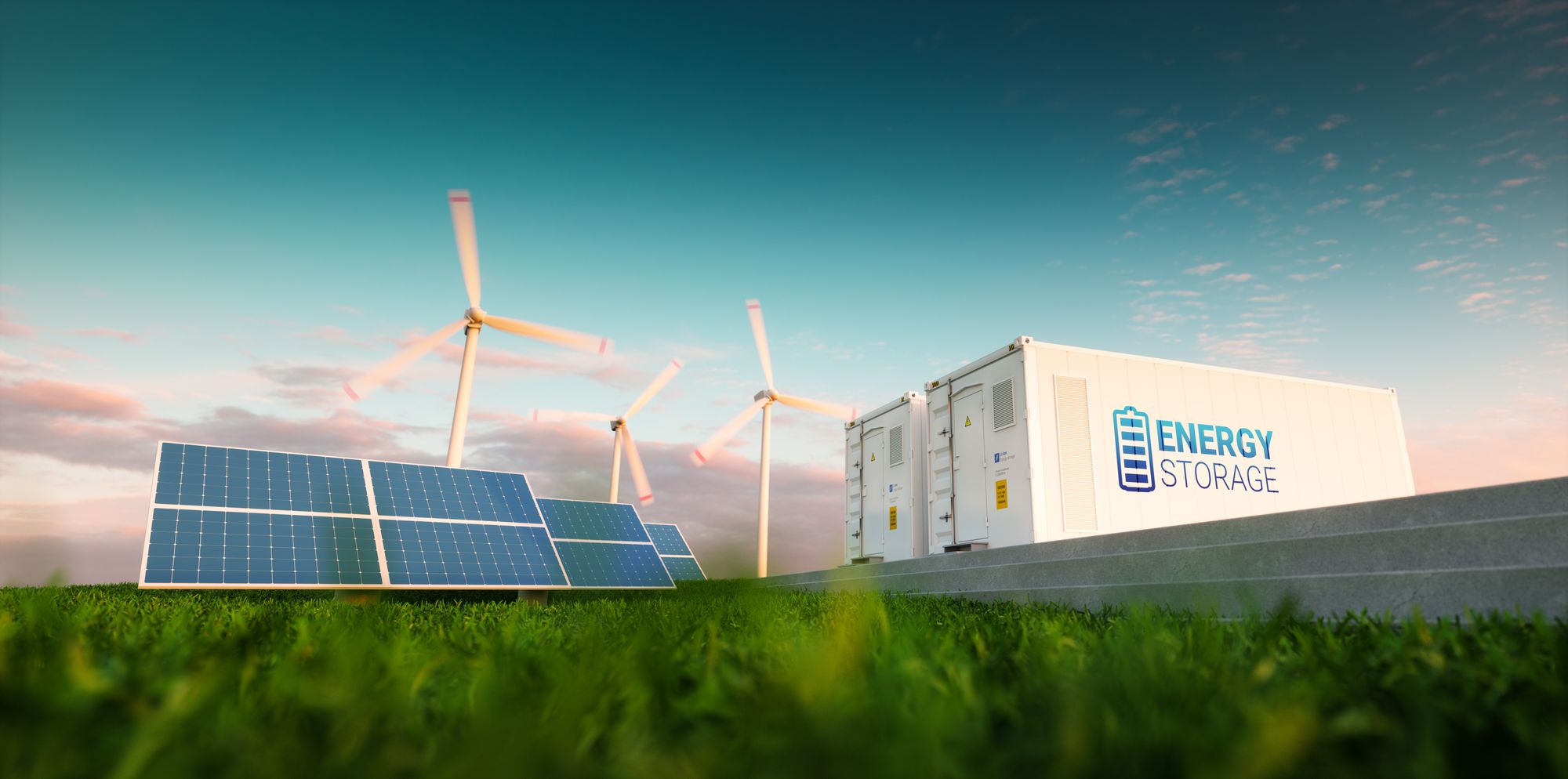
By becoming a premium supporter, you help in the creation and sharing of fact-based optimistic news all over the world.


